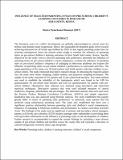Influence of Selected Parenting Styles on Pre-School Children’s Learning Outcomes in Kisii South Sub-County, Kenya

View/
Date
2017Author
Momanyi, Dorica Nyanchama
Type
ThesisLanguage
enMetadata
Show full item recordAbstract
The formative years of a child’s development are globally acknowledged as crucial years for holistic and ultimate future progression. Hence, the sustainable development goals strive towards achieving education for all school age children by 2030. In this regard, parenting styles have far reaching consequences hence the present study sought to examine the influence of parenting styles on pre-school children’s learning outcomes in Kisii South Sub-County, Kenya. Specific objectives for the study were to: discover parenting style preference; determine the influence of parenting styles on pre-school children’s social competence; evaluate the influence of parenting style on pre-school children’s frequency of indulging in behaviour problems and explore the influence of parenting styles on pre-school children’s performance in curriculum activities. The target population of this study was 58 lead teachers and 3,944 parents with their children in pre-school centres. The study employed descriptive research design. In obtaining the required sample size, the study used cluster sampling, simple random, and purposive sampling techniques. The sample of the study consisted of 351 parents and 51 pre-school lead teachers. Test-retest method was used to establish the reliability of the instruments which was found to be 0.89 for questionnaires for pre-school lead teachers and 0.82 for questionnaires for parents with pre-school children. Quantitative data collected was analyzed using descriptive and inferential statistical techniques. Descriptive statistics that were used included measures of central tendencies, frequency distributions and percentages. The inferential statistics that were used were the Pearson Product Moment Correlation Co-efficient, ANOVA and simple regression. Qualitative data was also analysed using thematic analysis. The study established that parents greatly differ in terms of parenting style preferences. In particular, most parents (62.7%) preferred using authoritarian parenting style. The study also established that there was a significant positive relationship between parenting style and children’s social competencies, frequency of indulging in behaviour problems and performance in various curriculum activities Areas. The findings of the study may be significant to primary and secondary school managers, parents at all levels, pre-schoolers, ECDE teachers amongst other stakeholders in providing them with up-to-date information on the influence of parenting styles on the development of children. Further research is recommended to expand the current findings by including a more diverse sample of pre-school children and teachers across the county that will represent a diversity of cultural background, economic status, age and gender.
Publisher
Africa Nazarene University
Collections
- Education [59]
